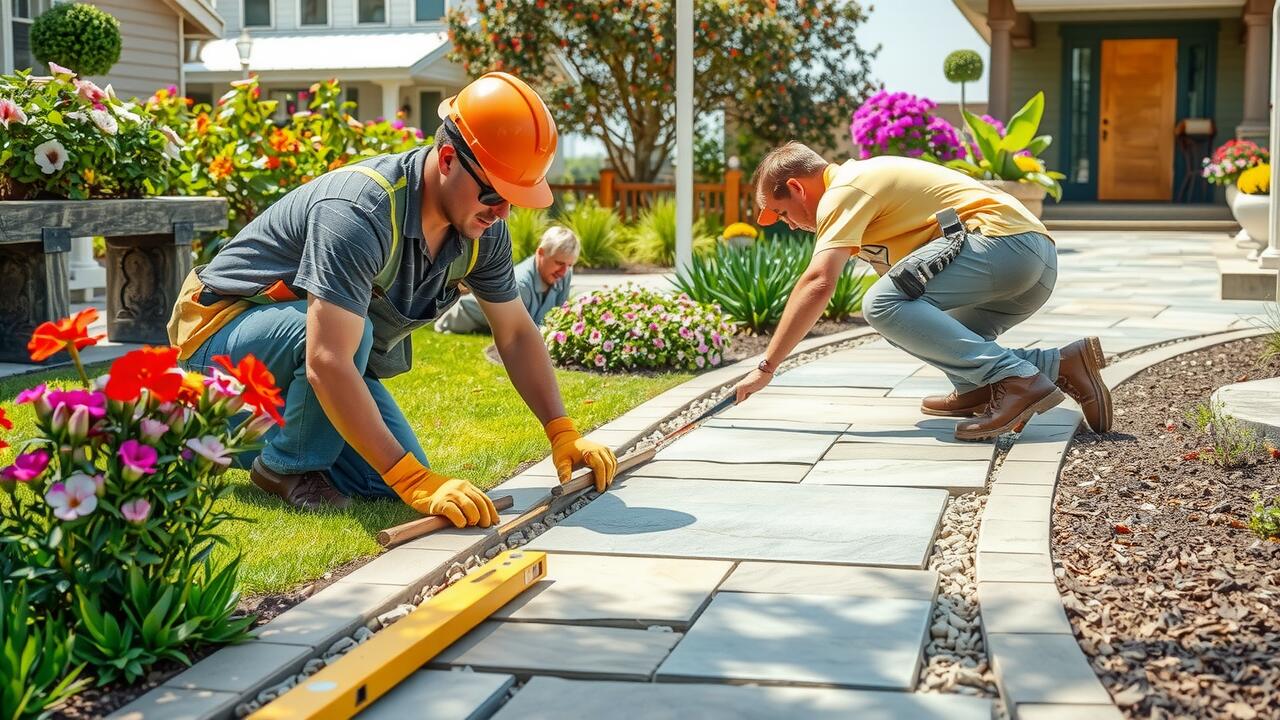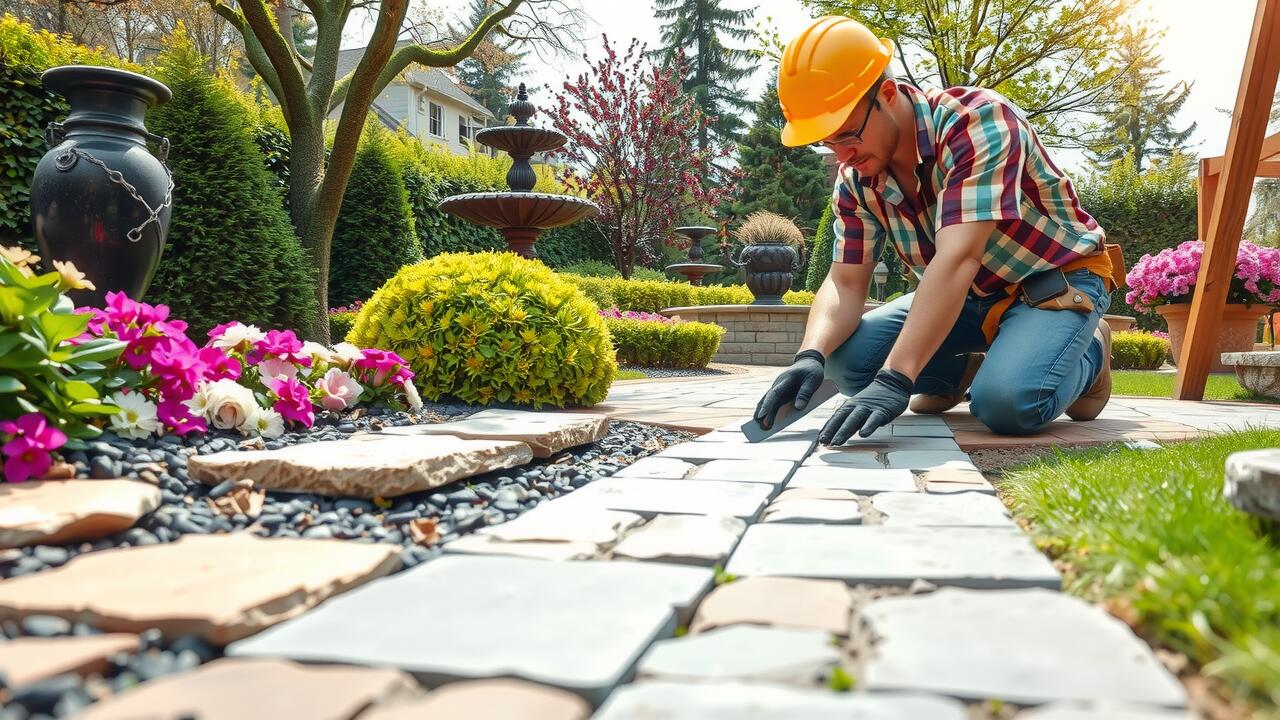
Natural Stone Paths
Natural stone paths offer a timeless aesthetic, enhancing the charm of any garden or outdoor space. These materials provide durability and natural beauty, making them a popular choice for many homeowners. However, the cost of natural stone can be a significant factor in deciding whether to pursue a walkway installation. While investing in high-quality stone can increase the overall value of a property, it’s essential to balance aesthetics with budget constraints.
When considering natural stone for walkway installation, it is useful to explore options that fit different price ranges. Local suppliers often carry a variety of stones, including slate, flagstone, and granite, which may vary in cost depending on availability and demand. Additionally, sourcing stones from nearby quarries or utilizing reclaimed stones can be more economical while maintaining aesthetic appeal. By researching and comparing prices, homeowners can achieve a beautiful pathway without overspending.
Finding Affordable Natural Stone
When considering natural stone for your outdoor path, cost can be a significant factor. One way to save is by sourcing locally. Local quarries or stone yards often offer better prices than big-box retailers. It’s also wise to check for any sales, discounts, or bulk purchase options. Understanding the different types of natural stone available can help in making an informed decision that aligns with your budget as well as your design preferences.
Another approach is to look for remnants or surplus stones from larger projects. Many stone suppliers have leftover materials from previous jobs that they sell at reduced prices. Additionally, exploring options for reclaimed natural stone can provide unique textures and colors while being more economical. Including these stones in your walkway installation not only creates an attractive path but also promotes sustainability by reducing waste.
Recycled Materials for Eco-Friendly Paths
Recycled materials offer an innovative approach to creating eco-friendly paths while also minimizing costs. Using items like old bricks, tiles, or concrete slabs helps to divert waste from landfills and adds a unique character to outdoor spaces. Many communities have local sources where these materials can be acquired at a significantly reduced price. Creative repurposing can also enhance the aesthetic appeal of a garden or yard while supporting sustainable practices.
When considering walkway installation, it’s important to assess the durability and maintenance of recycled options. Stone or brick pathways can last for years, requiring minimal upkeep. Additionally, incorporating other eco-friendly materials, such as crushed glass or reclaimed wood, can create visually striking designs. This approach not only reflects a commitment to environmental stewardship but also promotes individuality in landscaping.
Creative Ideas for Using Repurposed Items
Repurposed items offer a unique and eco-friendly approach to creating outdoor paths. Old bricks, discarded tiles, or even wooden pallets can be creatively transformed into stylish walkways. For example, you can arrange broken concrete pieces in a mosaic pattern for an eye-catching design. This not only makes use of materials that might otherwise go to waste but also provides a one-of-a-kind look that enhances the landscape.
Another imaginative idea involves using wine bottles or glass jars as borders for your path. Placing these along the edges not only helps to define the walkway but also adds a vibrant splash of color. These creative touches can make any walkway installation stand out while being cost-efficient. By incorporating such repurposed materials, you contribute to sustainability while showcasing your personal style in outdoor design.
Using Wood Chips for Walkways
Wood chips provide an affordable and attractive option for creating outdoor walkways. They offer a natural look that blends seamlessly with most landscapes. The installation process is straightforward, making them a popular choice for DIY enthusiasts. For those looking at Walkway Installation, preparing the ground and laying down a layer of wood chips can be quite simple. Proper maintenance, such as replenishing the chips over time, ensures that the pathway remains neat and functional.
In addition to cost efficiency, wood chips are environmentally friendly. They can be sourced from local tree trimming services or landscaping companies, promoting a sustainable approach to walkway solutions. The organic material decomposes naturally, enriching the soil beneath. When considering Walkway Installation, opting for wood chips not only enhances the visual appeal of outdoor spaces but also supports ecological health. This combination makes them a practical choice for homeowners seeking budget-friendly landscaping ideas.
Sustainability and Aesthetic Appeal
Wood chips offer an eco-friendly option for creating visually appealing walkways. They have a natural look and blend seamlessly with outdoor environments, enhancing the overall aesthetics of any garden or yard. The rich, earthy tones of wood chips can complement various landscaping styles. When properly applied, they provide a soft, inviting surface for pedestrians, making the walkway both functional and attractive.
The sustainability aspect of wood chips further elevates their appeal for walkway installation. Sourced from recycled materials, such as tree trimmings and construction waste, they minimize environmental impact while enriching soil when decomposed. This approach not only conserves resources but also promotes a healthier ecosystem. With the right maintenance, wood chip paths can withstand the elements, making them a durable choice for outdoor spaces.
FAQS
What are some of the cheapest materials for outdoor paths?
Some of the cheapest materials for outdoor paths include gravel, mulch, wood chips, and repurposed materials like bricks or stones.
Is natural stone a cost-effective option for outdoor paths?
While natural stone can be more expensive upfront, it is durable and long-lasting, which may make it a worthwhile investment in the long run.
How can I find affordable natural stone for my pathway?
Look for local suppliers, check for seasonal sales, or consider purchasing remnants or surplus stone from construction sites or landscaping companies.
What are some creative ways to use recycled materials for outdoor paths?
You can use old bricks, tiles, or even concrete chunks to create a unique pathway. Pallets can also be transformed into walkways with some creativity.
Are wood chips a good choice for walkways?
Yes, wood chips are an affordable and sustainable option for walkways. They provide a natural look and can improve drainage, but may need to be replenished over time.
